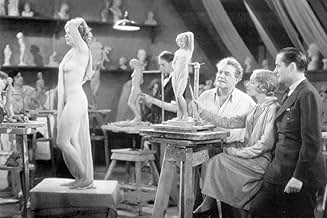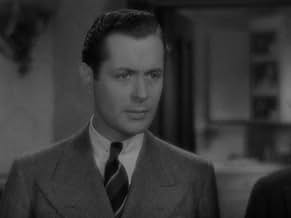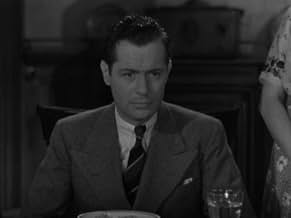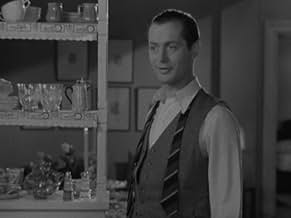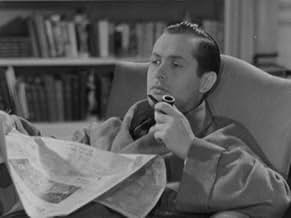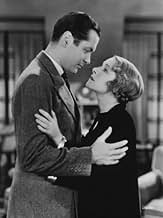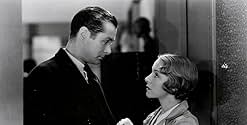अपनी भाषा में प्लॉट जोड़ेंA new bride learns she and her husband's stuck-up family don't speak the same language.A new bride learns she and her husband's stuck-up family don't speak the same language.A new bride learns she and her husband's stuck-up family don't speak the same language.
- पुरस्कार
- कुल 3 जीत
Julia Bejarano
- Umbrella Peddler
- (बिना क्रेडिट के)
William Farnum
- C. Forrester
- (बिना क्रेडिट के)
Sherry Hall
- Purser
- (बिना क्रेडिट के)
फ़ीचर्ड समीक्षाएं
Anyone interested in family relationships will surely enjoy this movie about a manipulative matriarch, Louise Closser Hale, who is not averse to fake fainting spells to get her way with her four sons and their wives. The acting is first-rate by a stellar cast, five of whom (John Beal, Hal K. Dawson, Irene Cattell, Maidel Turner and Margaret Hamilton) were in the original Broadway production which opened 25 April 1932, and who reprised their roles. This was also the film debut of Beal, Hamilton and Cattell (the only film she ever made). But kudos go to the magnificent Helen Hayes as the new addition to the family who stands up to Hale, John Beal, as her sensitive nephew who falls in love with her, and Robert Montgomery playing Hayes' husband, still under the control of his mother. I thoroughly enjoyed this movie. Stick with it until the end; the last 20 minutes are as riveting as any drama can be.
There's a good film hiding within "Another Language," but it's overshadowed by an overwrought plot and, most significantly, an unsympathetic central character.
The plot concerns Stella (Helen Hayes), a newlywed whose husband Victor (Robert Montgomery) is blind to his family's boorish behavior and their immediate dislike of his new bride. Worst in the bunch is his smothering mother (Louise Closser Hale), whose reaction in every scene is to pretend to be ill to gain her sons' sympathy. Why none of her stupid children see through her manipulative behavior boggles the mind. Victor (or as his family annoyingly calls him, Vicki) is the most frustrating character in the film. He takes his family's side whenever a conflict arises and treats his wife not only like a stranger, but with disdain. It's a mystery as to what Stella ever saw in him and for that matter, why she hasn't walked out on him. There's also a subplot involving Victor's nephew who falls in love with Stella that is never fully developed, nor is it resolved to a satisfying conclusion.
Another weakness, as someone else pointed out, is that the one family member who shows any compassion toward Stella is Victor's father (Henry Travers), yet he never stands up to his wife or any of the other relatives who are always attacking Stella.
Hayes is acceptable in her role, but it's easy to see why she never became a successful film star. Whatever magic she had on stage doesn't translate to the screen. Her acting is sometimes mannered and she doesn't have a face the camera would fall in love with. She isn't helped by Montgomery, who is just so unlikeable in this film. The two have zero chemistry.
Louise Closser Hale fares better as Mrs. Hallam, the mother-in-law from hell. The standout, though, is Margaret Hamilton in her film debut as one of Stella's sisters-in-law. Though bitchy most of the time, she does show some humanity in the final reels and is the only truly believable member of the family. The movie is only worth sitting for through the performance of this consummate character actor. It's like she's speaking another language compared to the rest of the cast.
The plot concerns Stella (Helen Hayes), a newlywed whose husband Victor (Robert Montgomery) is blind to his family's boorish behavior and their immediate dislike of his new bride. Worst in the bunch is his smothering mother (Louise Closser Hale), whose reaction in every scene is to pretend to be ill to gain her sons' sympathy. Why none of her stupid children see through her manipulative behavior boggles the mind. Victor (or as his family annoyingly calls him, Vicki) is the most frustrating character in the film. He takes his family's side whenever a conflict arises and treats his wife not only like a stranger, but with disdain. It's a mystery as to what Stella ever saw in him and for that matter, why she hasn't walked out on him. There's also a subplot involving Victor's nephew who falls in love with Stella that is never fully developed, nor is it resolved to a satisfying conclusion.
Another weakness, as someone else pointed out, is that the one family member who shows any compassion toward Stella is Victor's father (Henry Travers), yet he never stands up to his wife or any of the other relatives who are always attacking Stella.
Hayes is acceptable in her role, but it's easy to see why she never became a successful film star. Whatever magic she had on stage doesn't translate to the screen. Her acting is sometimes mannered and she doesn't have a face the camera would fall in love with. She isn't helped by Montgomery, who is just so unlikeable in this film. The two have zero chemistry.
Louise Closser Hale fares better as Mrs. Hallam, the mother-in-law from hell. The standout, though, is Margaret Hamilton in her film debut as one of Stella's sisters-in-law. Though bitchy most of the time, she does show some humanity in the final reels and is the only truly believable member of the family. The movie is only worth sitting for through the performance of this consummate character actor. It's like she's speaking another language compared to the rest of the cast.
"Another Language" works because the whole is greater than the sum of its parts - and that is not meant to insult the parts. Robert Montgomery plays multiple roles, and he plays them all well: sometimes a genuinely caring husband, sometimes a stand-offish snob, and sometimes a superior bully. It's as if he was doing a greatest hits part.
It is Helen Hayes, however, in one her rare film appearances, who shines out a little more than everyone else. She was really a fine actress, here playing the increasingly isolated and desperate wife of Robert Montgomery, the victim of a squeezing out instigated by Montgomery's petty family. Interesting how at one point one of his "sister-in-laws" suggests that Hayes is "not even that pretty". I guess she really wasn't particularly so, her eyes in particular seemingly too far apart.
But the script moves along delightfully. The ensemble scenes, of which there are many, bringing all 10 or so characters on screen at one time, are surprisingly fun. This is because the writers have managed to accomplish something quite difficult, in allowing the different character's personalities slowly to come through. None of them is all good, but none of them is really all bad, though as a group they are intimidating to poor Helen Hayes.
Even Margaret Hamilton, made up and dressed up to be especially homely, who appears to be the nastiest of the women, shows a little humanity at times - but it is never overdone. A nice touch.
But Henry Travers, as the kindly father, is a source of frustration for the viewer: he knows the games that everyone is playing, and is genuinely sympathetic to Hayes, yet he never actually speaks up for her. This weakness is all the more irksome because it is his wife, the manipulative matriarch (played quite well by Louise Hale), with her many fake fainting spells, who is the cause of the film's discord, and though he is not afraid of her, he never helps out either.
An interesting film, and not as predictable as it might seem.
It is Helen Hayes, however, in one her rare film appearances, who shines out a little more than everyone else. She was really a fine actress, here playing the increasingly isolated and desperate wife of Robert Montgomery, the victim of a squeezing out instigated by Montgomery's petty family. Interesting how at one point one of his "sister-in-laws" suggests that Hayes is "not even that pretty". I guess she really wasn't particularly so, her eyes in particular seemingly too far apart.
But the script moves along delightfully. The ensemble scenes, of which there are many, bringing all 10 or so characters on screen at one time, are surprisingly fun. This is because the writers have managed to accomplish something quite difficult, in allowing the different character's personalities slowly to come through. None of them is all good, but none of them is really all bad, though as a group they are intimidating to poor Helen Hayes.
Even Margaret Hamilton, made up and dressed up to be especially homely, who appears to be the nastiest of the women, shows a little humanity at times - but it is never overdone. A nice touch.
But Henry Travers, as the kindly father, is a source of frustration for the viewer: he knows the games that everyone is playing, and is genuinely sympathetic to Hayes, yet he never actually speaks up for her. This weakness is all the more irksome because it is his wife, the manipulative matriarch (played quite well by Louise Hale), with her many fake fainting spells, who is the cause of the film's discord, and though he is not afraid of her, he never helps out either.
An interesting film, and not as predictable as it might seem.
Rose Franken, now forgotten, was an estimable playwright of the first half of the 20th century, one of the very few women to reliably write Broadway hits. This is one such hit, a 1932 drama faithfully filmed with much of the original cast, with dialog neatly refashioned by two of MGM's best screenwriters, Herman Mankiewicz and Donald Ogden Stewart. Franken wrote particularly well about family dynamics, and that's pretty much all this is, the story of young marrieds threatened by the groom's unquestioning domination by a catty, conservative family, most especially his horror of a mother, well played by Louise Closser Hale. He's not an especially likable hero, often petty, self-centered, and domineering toward his wife, and Montgomery isn't afraid to emphasize his less attractive traits. So Helen Hayes is left to suffer quietly, trying to maintain her composure as his relatives mercilessly nitpick at her, and crushed every time she attempts to fight back. Hayes is, as usual, sexless, but she effectively catches this woman's desperation, and she partners well with John Beal, quite touching as the nephew who falls in love with her. (What happens to him? After his final exit, I expected to hear an offstage gunshot.) It's economical, swift storytelling, with a bunch of good character actors in support, and their portrayals, thanks largely to the writing, are well-rounded-- nobody's totally awful, except Louise Closser Hale's grasping mama.
A marvelous movie, from start to (just before the) finish.
We meet Robert Montgomery and Helen Hayes, with whom he has eloped recently, on shipboard. She is eager to start their home life together. All he can think of is seeing his mother.
Louise Closser Hale is superb as the suffocating matriarch of his family. The other members, including Henry Travers and Margaret Hamilton, are very good as well. Especially fine is John Beal, as Montgomery's nephew. Indeed, he gives a heart-wrenching performance. It's possibly the best in this movie and he is working against very stiff competition.
Montgomery is not only a mama's boy -- called Vicky by everyone, as his name is Victor. He is also a supreme narcissist: In one shocking scene, he inspects himself in a mirror over the mantel. Directly under the mirror is a plaster bust of him that Hayes has lovingly worked on sculpting. He doesn't even notice it.
It's very hard to fault this movie. The ending is a trifle disappointing. And a Mark Twain aphorism is spoken by one character and laughed at by others, as if it were original to this screenplay.
Hayes is superb and very likable. Montgomery, not generally a favorite of mine, is believable as her self-centered husband. Beal is absolutely superb in a very touching role. And Hale is subtle but compelling as the woman of iron who becomes an invalid the minute doing so will get what she wants from her offspring.
We meet Robert Montgomery and Helen Hayes, with whom he has eloped recently, on shipboard. She is eager to start their home life together. All he can think of is seeing his mother.
Louise Closser Hale is superb as the suffocating matriarch of his family. The other members, including Henry Travers and Margaret Hamilton, are very good as well. Especially fine is John Beal, as Montgomery's nephew. Indeed, he gives a heart-wrenching performance. It's possibly the best in this movie and he is working against very stiff competition.
Montgomery is not only a mama's boy -- called Vicky by everyone, as his name is Victor. He is also a supreme narcissist: In one shocking scene, he inspects himself in a mirror over the mantel. Directly under the mirror is a plaster bust of him that Hayes has lovingly worked on sculpting. He doesn't even notice it.
It's very hard to fault this movie. The ending is a trifle disappointing. And a Mark Twain aphorism is spoken by one character and laughed at by others, as if it were original to this screenplay.
Hayes is superb and very likable. Montgomery, not generally a favorite of mine, is believable as her self-centered husband. Beal is absolutely superb in a very touching role. And Hale is subtle but compelling as the woman of iron who becomes an invalid the minute doing so will get what she wants from her offspring.
क्या आपको पता है
- ट्रिवियाModern sources state that Helen Hayes replaced Norma Shearer in the lead after Shearer decided to stay at home and nurse her husband, Irving Thalberg, who had suffered a serious heart attack.
- गूफ़When Sally is pouring coffee for Victor, she gets distracted and spills some - it splashes out of the saucer and onto the tablecloth. However, in the next shot where she switches cups with Victor, there is no evidence of the spilled coffee on the tablecloth.
- भाव
Mother Hallam: [Victor has left the house against his mother's wishes] Victor! Come back here!
[she swoons]
Pop Hallam: Don't bother to faint, Mom, he can't see you.
Mother Hallam: [suddenly alert, and very irritated] Shut up!
- क्रेज़ी क्रेडिटIn the beginning credits portraits of the actors who portray the main characters are shown with a hand flipping through a photo album of the Hallam Family.
- कनेक्शनFeatured in This Side of Heaven (1934)
- साउंडट्रैकThe Wedding of the Painted Doll
(uncredited)
Music by Nacio Herb Brown
Lyrics by Arthur Freed
Played on the Victrola
टॉप पसंद
रेटिंग देने के लिए साइन-इन करें और वैयक्तिकृत सुझावों के लिए वॉचलिस्ट करें
विवरण
बॉक्स ऑफ़िस
- बजट
- $2,72,297(अनुमानित)
- चलने की अवधि
- 1 घं 17 मि(77 min)
- रंग
- पक्ष अनुपात
- 1.37 : 1
इस पेज में योगदान दें
किसी बदलाव का सुझाव दें या अनुपलब्ध कॉन्टेंट जोड़ें

